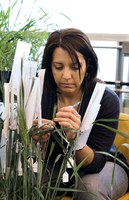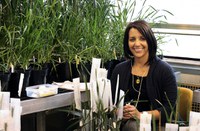NDSU Wheat Researcher Fights Rust Disease
(Click an image below to view a high-resolution image that can be downloaded)
A driving force behind Maricelis Acevedo’s research is to make a difference.
The assistant professor in the North Dakota State University Department of Plant Pathology certainly is doing that. Acevedo specializes in leading research dealing with rust disease in wheat, a fungal infection that can have devastating results on plants. In some parts of the world, the crop-killing fungus is called the “polio of agriculture.”
“I’m very passionate about working with rust pathogens, ultimately with a goal of increasing food security in the U.S. and around the globe,” Acevedo says. “I find them very interesting because they are highly diverse, and new virulent races are constantly emerging. That keeps us on our toes and always trying to stay ahead of the pathogen. I love the challenge of working on that type of research project.”
Her research emphasizes genetics to build resistance to leaf and stem rust in wheat. The work is especially important for North Dakota because the State Wheat Commission reports about 19,200 farms grow wheat. The state typically ranks second only to Kansas in total wheat production each year.
“Working in North Dakota is the perfect place because of wheat’s importance as a commodity, a way of living and its history in the state,” says Acevedo, who joined NDSU’s faculty in 2010. “It’s exciting to be working in an area where agriculture really is appreciated and our research is valued.”
Acevedo is becoming an authority in her field of study. She was one of the inaugural recipients of the Jeanie Borlaug Laube Women in Triticum Early Career Award. In May 2013, she was an invited speaker at the Internal Symposium on Genetics and Breeding Durum Wheat in Rome, and she also presented at the “1st Workshop of Surveillance of Race Ug99 in South America and Breeding for Resistance” in Passo Fundo, Brazil. She recently was one of 16 scientists invited to the Melinda and Bill Gates Foundation in Seattle to brainstorm about future needs in wheat research.
A native of Puerto Rico, Acevedo earned her bachelor’s degree in biology and master’s degree in agronomy at the University of Puerto Rico-Mayaguez. She earned her doctorate in biological sciences at the University of Nebraska-Lincoln. Before joining NDSU, Acevedo received postdoctoral training at the U.S. Department of Agriculture’s Agricultural Research Service Small Grains and Potato Research Unit in Aberdeen, Idaho.
“I like the idea of working with a purpose, to make a difference in people’s lives,” Acevedo says. “I want to apply the research in the field and facilitate getting it to market as prudently as possible. I’d like to provide better information and more understanding of how rust pathogens interact with the plant, so researchers can develop better ways to manage the disease, like new technologies and new chemicals.”
Another aspect of her work is serving as a mentor and role model for students. She works in a field where the majority of researchers historically have been men, but that is starting to shift. Half of the graduate six students she works with are women from different cultural and ethnic backgrounds.
Acevedo received a 2013 Leap Research Award from NDSU’s FORWARD program, which works for the advancement of women.
“I think I bring to the table other points of view and push research boundaries,” Acevedo says. “My lab provides evidence how diversity can provide changes in how we approach science. We try to keep an open mind and a ‘think-outside-of-the-box’ approach on research.”
NDSU Agriculture Communication – March 7, 2014
| Source: | Maricelis Acevedo, (701) 231-8051, maricelis.acevedo@ndsu.edu |
|---|---|
| Editor: | Steve Bergeson, (701) 231-6101, steven.bergeson@ndsu.edu |



